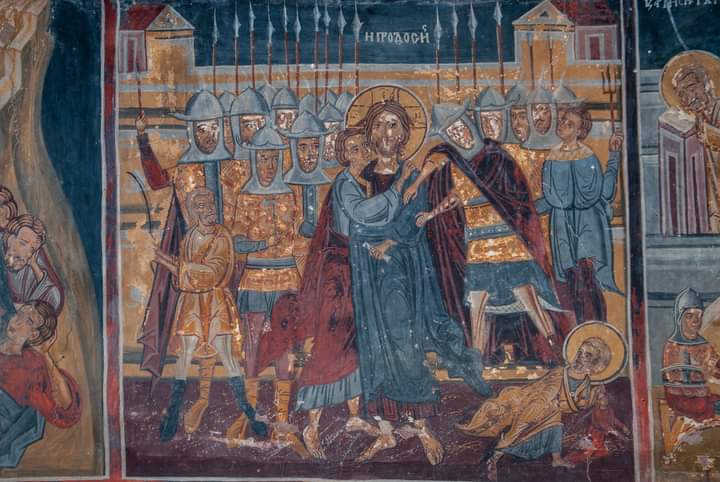The IX All-Russian scientific and practical conference of the Russian Orthodox Church and the penal system of the Russian Federation was held at the Academy of the Federal Penitentiary Service of Russia.
The event was held at the beginning of November within the framework of the International scientific and practical conference on the problems of execution of criminal punishments, dedicated to the 90th anniversary of the Academy of the Federal Penitentiary Service of Russia, and was dedicated to the introduction of the probation system in Russia and the establishment of the institution of assistants to pre-trial detention facilities for work with believers.
The conference was attended by: the head of the group for organizing work with believers of the Federal Penitentiary Service of Russia’s Department of the Supreme Court of the Russian Federation Sergei Gurov, assistants to the heads of the Federal Penitentiary Service for organizing work with believers, assistants to the heads of pretrial detention centers for working with believers, clergy of religious associations traditional for Russia, the faculty of the Academy of the Federal Penitentiary Service of Russia, representatives of public organizations providing assistance to prisoners, as well as persons released from places of imprisonment.
The forum was headed by the acting chairman of the Synodal Department for Prison Ministry, priest Kirill Markovsky.
The first section of the conference was devoted to the consideration of issues related to the introduction of a penitentiary probation system in Russia from January 1, 2024, and post-penitentiary probation from January 1, 2025. Before the conference participants began their speeches, priest Kirill Markovsky presented awards from the Synodal Department for Prison Ministry to the executive secretary of the board of departments for prison ministry of the Don Metropolitanate, the head of the Spas charity shelter, priest Andrei Mnatsaganov, the chairman of the department for prison ministry of the Saransk diocese, assistant to the head of the pre-trial detention center No. 1 of the Federal Penitentiary Service of Russia for the Republic of Mordovia for work with believers, Archpriest Vladimir Menshoikin, and the chairman of the board of the public organization “House of Diligence “Noah”” Emelyan Sosinsky for many years of work in providing assistance to prisoners and people released from places of imprisonment. Opening the conference, priest Kirill Markovsky emphasized its importance and practical significance, pointing out that the main goal of cooperation between the Church and the penal system is to really help a person who is in prison or has just been released from prison to survive a difficult period of trials, to find the meaning of life that extends into eternity, to find strength for a new life in society not only according to human laws, but also according to the laws of God; to help employees of the penitentiary system worthily carry out the important and responsible service that God has entrusted to them and the state has entrusted to them. According to priest Kirill Markovsky, by adopting the law on probation, the state has certainly extended a hand to a person who has found himself in a difficult life situation. However, it is important to remember that it is impossible to integrate a person into society if he is convinced that it is possible to achieve well-being in life by committing illegal acts, or if he does not have the spiritual strength to resist those sinful desires that have taken root in him due to his past criminal life. “Therefore, first of all, our efforts should be aimed at achieving those positive changes in the mind and soul of the convicted person, which will be the basis for his law-abiding behavior after release. And this work, which is the foundation of probation, must begin in the pre-trial detention center, where the person who committed the unlawful acts ends up. If we do not succeed in this work, then all our other efforts may prove fruitless,” the head of the Synodal Department emphasized. Priest Kirill Markovsky noted that the Church, which has a thousand-year experience in healing the human soul, is currently doing a lot of work in places of forced detention. The UIS has created all the conditions for this, introduced the positions of assistants to the heads of territorial bodies of the Federal Penitentiary Service of Russia for work with believers, assistants to the heads of pre-trial detention centers for work with believers, who are replaced by clergy. The administration of the institutions for the most part tries to meet the prison clergy halfway. But the clergy themselves are not always sufficiently active.
“Yes, we have many wonderful pastors, zealous workers in the field of Christ, who bring worthy fruit to God, bring many to Christ, and bring many despairing people back to life. We express our sincere gratitude to such clergy. But not all pastors fully realize in their prison ministry the gift that was given to them “with the laying on of hands of the priesthood” (1 Tim. 4:14). The chairmen of the prison ministry departments must closely monitor how the clergyman carries out his pastoral work in the pretrial detention center or correctional institution. Give advice to young priests, explain the importance of the ministry of the Church’s pastor in places of human sorrow, which were and will be places of imprisonment,” the priest noted. The head of the synodal department emphasized that the work of a priest in a correctional institution should not be limited to celebrating the Liturgy. It is necessary to hold meetings and talks with the general mass of convicts, actively interact with the institution’s psychologists to identify individuals in a crisis situation, more actively involve lay specialists in the field of church service, and conduct spiritual and educational work with the UIS employees.
Assistant to the head of the Main Directorate of the Federal Penitentiary Service of Russia for St. Petersburg and the Leningrad Region for organizing work with believers, professor of the Department of Church and Practical Disciplines of the St. Petersburg Theological Academy, Archpriest Oleg Skomorokh, spoke about the participation of the Russian Orthodox Church in the implementation of the Federal Law “On Probation in the Russian Federation”, noting that with the adoption of this law, the activities for the resocialization and social adaptation of individuals subject to probation have finally become systemic. In addition, the Church has opportunities to participate jointly with non-profit organizations in the activities of probation centers. Archpriest Evgeny Lishchenyuk, head of the joint commission of prison ministry of the Voronezh Metropolitanate, shared his experience of prison and social ministry, providing assistance to former convicts, including work on the rehabilitation of alcohol and drug addicts. Priest Andrei Mnatsaganov spoke about the activities of the “Spas” charity shelter or “halfway hotel” that he created and heads, where those who want to start a law-abiding life on the outside or have no fixed place of residence can come immediately after their release from prison.
The founder and chairman of the board of this public organization, Yemelyan Sosinsky, reported on the work of the largest network of homeless shelters in Russia, the Noah House of Labor, located in the Moscow Region and including labor and social homes where more than 1,200 people live. Noah has become a “social lift” for a huge number of people. Now many of those who were previously at the very bottom and doomed to perish have found work, a family and a meaning in life.
The second section of the conference was devoted to the formation and development of the institute of assistants to the heads of pretrial detention centers for work with believers. The positions of full-time prison clergy in pretrial detention centers were introduced on January 1, 2024, and at present almost all of them are staffed.
As noted by priest Kirill Markovsky, all priests who have been appointed to the positions of assistants to the heads of pretrial detention centers are pioneers. Being both clergy and officials, they perform, without exaggeration, a sacrificial service associated with a wide range of responsibilities. In addition, pastoral work with suspects and accused has its own characteristics in comparison with the spiritual care of convicts in a correctional institution. And if in a penal colony convicts who have committed crimes of approximately the same degree of severity serve their sentences, then in a pre-trial detention center a priest encounters suspects and accused of a wide variety of crimes – from minor crimes to especially serious ones. He must be able to provide spiritual assistance to men, women, and minors. In this regard, special attention should be paid to the preparation of priests for such a service. Currently, assistants to the heads of pre-trial detention centers for work with believers are trained at the Academy of the Federal Penitentiary Service of Russia, but the pastoral block for priests of the Russian Orthodox Church is missing from the curriculum. It is extremely necessary to include meetings with experienced prison chaplains who have been ministering to pretrial detention centers for many years in the training program. Moreover, in some pretrial detention centers, priests appointed to the position of assistants to the heads of work with believers have not previously had experience in pastoral work with suspects and defendants.
The head of the group for organizing work with believers of the Federal Penitentiary Service of Russia, Sergei Gurov, told the conference participants about the legislative norms and the specifics of the work of prison chaplains in pretrial detention centers.
Archpriest Oleg Skomorokh, assistant to the head of the Federal Penitentiary Service of Russia for organizing work with believers, spoke about the multifaceted activities of priests in the largest Russian pretrial detention center No. 1 “Kresty” in St. Petersburg. The assistant to the head of the pretrial detention center No. 3 of the Federal Penitentiary Service of Russia for the Republic of Bashkortostan, Imam-Khatib Insaf-khazrat Iskandarov, spoke about the spiritual care of people who profess Islam and the prevention of extremism and terrorism in places of imprisonment.
The conference became a discussion platform that allows one to become familiar with the best practices in providing spiritual and social assistance to prisoners and persons released from places of imprisonment, to see problematic issues that arise in the process of implementing prison ministry, to concentrate the efforts of various social institutions on solving one of the most important tasks – the decriminalization of society.
Source: Synodal Department for Prison Ministry/Patriarchia.ru





